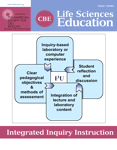Abstract
Undergraduates entering science curricula differ greatly in individual starting points and learning needs. The fast pace, high enrollment, and high stakes of introductory science courses, however, limit students’ opportunities to self-assess and modify learning strategies. The University of Washington's Biology Fellows Program (BFP) intervenes through a 20-session, premajors course that introduces students to the rigor expected of bioscience majors and assists their development as science learners. This study uses quantitative and qualitative approaches to assess whether the 2007–2009 BFP achieved its desired short- and long-term impacts on student learning. Adjusting for differences in students’ high school grade point average and Scholastic Aptitude Test scores, we found that participation in the BFP was associated with higher grades in two subsequent gateway biology courses, across multiple quarters and instructors. Two to 4 yr after participating in the program, students attributed changes in how they approached learning science to BFP participation. They reported having learned to “think like a scientist” and to value active-learning strategies and learning communities. In addition, they reported having developed a sense of belonging in bioscience communities. The achievement of long-term impacts for a short-term instructional investment suggests a practical means to prepare diverse students for the rigors of science curricula.



